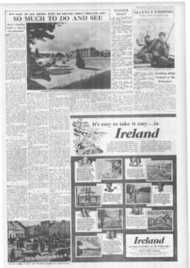Page 1, 1st February 1957
Page 1

Report an error
Noticed an error on this page?If you've noticed an error in this article please click here to report it.
Tags
Share
Related articles
Catholic Unionist Plea
A Christian Party To Unite Europe
On The Brink
Britain And Europe
Cossemon Market A Step Back From Road To Collapse
PLAN TO UNITE SIX POWERS
By John Biggs-Davison, M.P.
MR. Macmillan has bidden Britain draw closer to Europe.
The new Prime Minister is a man who has taken a leading part in the movement for a United Europe. He has assumed office at a time when Britain has the opportunity and the need for European leadership.
The initiative in this cause was taken by the France of the Christian Democrats and by Catholic statesmen like Schuman and
Adenauer. They were impelled not only by the Russian danger and the danger of economic collapse but by their memory of European unity in Western Christendom.
Europe was for them not only a common civilisation but the Faith. They were sustained by the varied forces of Christian Democracy and the powerful and generous support of the United States.
The Schuman Plan resulted in the pooling of the coal and steel of France, Belgium, Luxembourg and the Netherlands (the Benelux Union), Italy and Western Germany. Those who designed this European Coal and Steel Community sought not merely economic advantage. They knew that it would give rise to a demand for further economic and for political integration.
NO TARIFFS
A European Defence Community was planned and a Statute for a European Political Community drawn up. But ambitious federalism foundered on the rock of ineradicable nationalism, especially in France.
Now the plan is for a Common Market for the above mentioned Six Powers and a partial free trade area in Europe.
This Six -Power Common Market must be distinguished from the partial free trade area.
The Common Market of the Six will he a customs union such as the Americans enjoy. Within 10 or 15 years, all tariffs between the six countries would be removed and they would form a single customs union against outsiders.
Success here would powerfully promote eventual political and social community.
The Macmillan Plan is that the United Kingdom and other European countries which cannot join an economic federation should associate themselves with this SixPower Common Market or customs union in a partial free trade area—partial because Britain wants agriculture to be excluded. This is to safeguard Commonwealth agricultural exports to Britain.
Great Britai n, the Irish Republic, the Scandinavian nations and other adherents to the partial free trade area would progressively remove their tariffs on imports of European manufactures.
What then would be the difference between the Six and the others? The customs union of the Six would have a unified customs tariff, whereas the adherents of the partial free trade area would he free to impose their own tariffs against non-member countries.
The whole plan with its professed aim of securing European economic unity and independence is not yet complete and would only gradually be applied.
TRUE UNITY
Frances protected producers are protesting: Dutch and Italian farmers and German industrialists do not see why other countries should demand special privileges. France wants to bring in the whole French Union and to secure capital for overseas investment from her partners in Europe.
The French Union and the British Commonwealth are in a sense a New Europe. Mr. Robert Sencourt described ours as "an Empire whose heart touches Europe and shares its soul."
The competing industries of Britain and the Continent need the raw materials of their overseas partners in Africa and throughout the world if Europe is to form a balanced economic whole.
Nor must Western Europeans forget their fellow-Europeans who still lie under the Soviet knout. European Union should be flexible enough to allow of the entry after liberation of the peoples now in thrall to Communism.
Here, then, is the problem. Europe is a society of nations which needs and yearns for unity —a unity which takes full account of European responsibilities overseas. In the achievement of a true unity in diversity Britain has a decisive part to play. Upon her depends not only her survival as a Power hut the survival of European and Christian civilisation ringed round by materialist forces.
blog comments powered by Disqus











